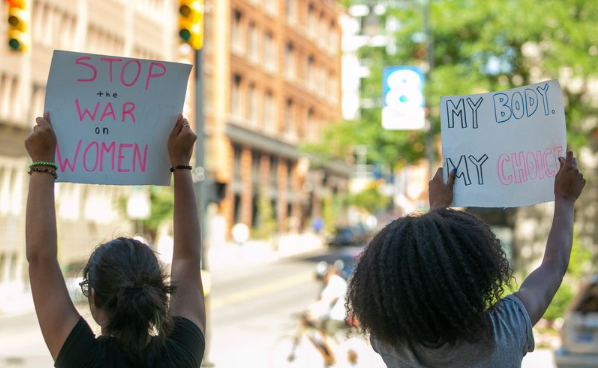‘Listen to Black women.’ How we start to fix racial inequities exposed by abortion issue featuring Dr. Ijeoma Nnodim Opara
July 29, 2022
While white women are lamenting the rights the U.S. Supreme Court removed last month, Black women are reminded of what they’ve felt for decades, even centuries.
Their rights always have been compromised, always threatened, said Dr. Ijeoma Nnodim Opara, assistant professor of internal medicine and pediatrics at Wayne State University School of Medicine.
“This is just another level of what has always been.”
Discrepancies, rooted in and inextricably linked to the nation’s history of white supremacy and anti-blackness, already exist, said Nnodim Opara, founding director of an initiative and curriculum, Health Equity and Justice in Medicine.
Outcomes now, with abortion tenuously legal in Michigan, are worse for Black women compared to white women. A ban, if enforced in the state, would only widen the chasm, causing more maternal and infant death and perpetuating or reinforcing social and economic imbalances, doctors and experts said.
“The playing field has never been level,” said Jerry Barton of Battle Creek, a 53-year-old maintenance worker and father of five who has a Black father, uninvolved in his upbringing, and a white mother.
He was standing downtown with his fiancée Lora Thomas, 48, of Battle Creek, a Black woman who works in a laundry facility. Years ago, pregnant by a man she did not want to make a father, she said she had an appointment to abort her daughter, but, as a Christian, decided it was wrong.
Instead, she raised the girl, now a teenager, and an older son as a single mother. Meanwhile, she handled her own traumas, of childhood abuse, of the shooting death of her dad when she was not yet 2.
“It ain’t been easy. It ain’t been easy, but she loves her daughter,” Barton said.
Both believe women should have the choice, the power to determine their own course.
“Because anything can happen to anybody at any time. And it always seems to be where you don’t expect it,” Thomas said.
In 2021, Black women accounted for 55% of abortion services in Michigan, despite Black residents making up about 14% of the state’s population, according to data from the Michigan Department of Health and Human Services.
Between 2014 and 2018, Black women who continued with pregnancies were 2.8 times more likely to die from pregnancy-related causes than their white counterparts in Michigan, according to the state health department data, and that’s an improvement. From 2007 to 2010, they were five times more likely to perish.
The fate of their babies is similarly in contrast. Five white babies younger than one died per 1,000 live births in 2020 in Michigan. The Black infant death rate was almost 3 times higher with 14 per 1,000 live births, the state health department reported.
“No matter where you kind of want to look at the process of reproduction, women of color, and especially Black women and women who live on low incomes, are disproportionately affected,” said Dr. Lisa Harris, professor of reproductive health, obstetrics and gynecology, and women’s and gender studies at the University of Michigan, where she also directs the fellowship program in family planning.
These groups are least likely to have access to health care to prevent pregnancy, leading to unintended pregnancies, and most unable to travel to another state where abortion is allowed, Harris said. They also might not have the resources – money or credit cards – to attain medications for self-managed abortion, and if they do, chances are probably greater they will be criminalized, detained or prosecuted for it. “Because of the inequities and bias and racism built into how physicians report people who they think did something illegal.”
Read, “‘Listen to Black women.’ How we start to fix racial inequities exposed by abortion issue” from MLive.
